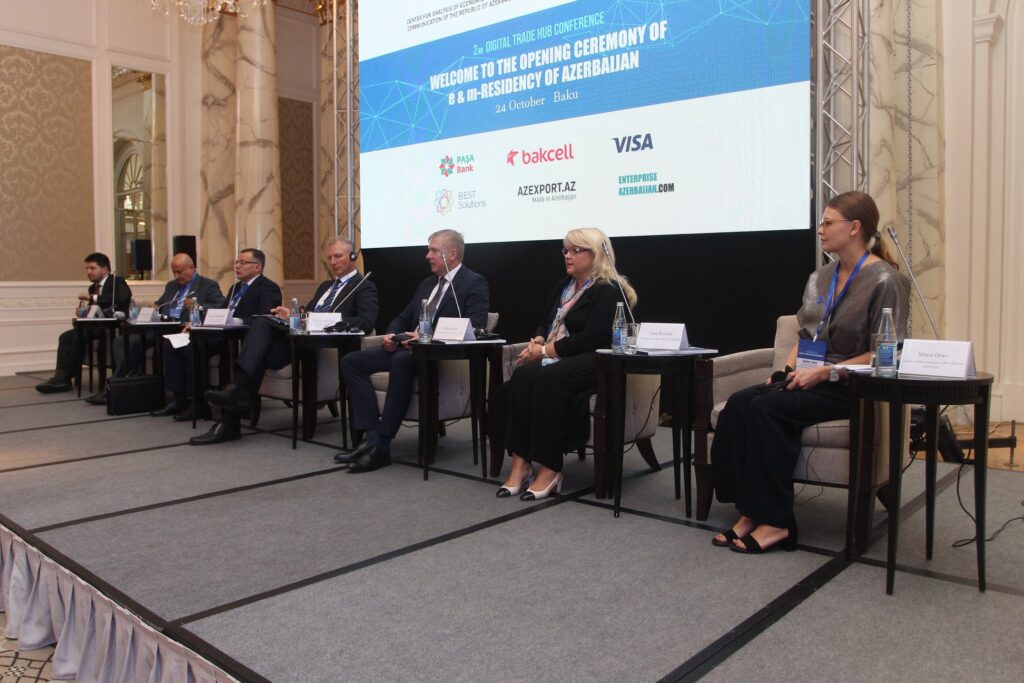
Azerbaijan’s Efforts to Attract Global Entrepreneurs: E and M-Residency
by Fintechnews Switzerland December 3, 2019In recent years, Azerbaijan has made efforts to become more attractive to global entrepreneurs, launching in 2017 the Digital Trade Hub (DTH) to help develop the digital ecosystem and attract foreign investors and small business owners.
One of the DTH’s major initiatives so far has been the introducing the electronic residency (e-Residency) and mobile residency (m-Residency) program in 2018, a move that made Azerbaijan the second country in the world after Estonia to offer an e-Residency program aimed at provision of easy, fast and reliable services to foreign investors and businesses, and the first country in the world to offer m-Residency.

Opening Ceremony of the E and M-Residency Programs of Azerbaijan, October 2018, Center for Analysis of Economic Reforms and Communications
Azerbaijan’s e-/m-Residency program
e-Residency and m-Residency are a government program that allows entrepreneurs around the world to set up and run a location-independent business in Azerbaijan using the cross-border e-services of the DTH of Azerbaijan.
e-Residency and m-Residency are essentially the same, except that e-residents receive a chip-enabled ID card for authentication and electronic signatures, while m-residents are issued with special Asan İmza (Mobile ID) SIM card that performs the same function.

Asan İmza (Mobile ID) SIM card, Digital Trade Hub of Azerbaijan, Center for Analysis of Economic Reforms and Communications
Similarly to Estonia, e-/m-residents of Azerbaijan receive a government-verified electronic identity, which they can use in an online environment. e-/m-residents are allowed to establish a company 100% online, and access business banking, online payment service providers, as well as e-government services to declare their taxes, file customs declarations, register new employee, sign documents electronically, and more. All this can be done entirely remotely without having to enter the country.
The e-/m-Residency costs 85 AZN (US$50). A company set up is 170 AZN (US$100) and a virtual office, 200 AZN (US$117) a year.
Since the beginning of 2019, Azerbaijan has been offering a number of incentives for global entrepreneurs and micro and small businesses owners. This includes a three-year complete tax exemption for companies and individual entrepreneurs with a startup certificate, following which they are required to pay 5% in profit tax, compared to the usual 20% corporate tax.
As of November 2019, more than a hundred people have applied for a e-/m-Residency.
Azerbaijan’s digital push
Over the past couple of years, Azerbaijan has been pushing for greater digitalization of its economy through various means.
At the third annual Digital Trade Forum in October, the state-run Center for Analysis of Economic Reforms and Communications in Azerbaijan, along with private companies including AzerTelecom, PASHA Bank and BEST Solutions, inked a public-private partnership agreement to help Azerbaijan become a regional digital hub.

3rd Digital Trade Forum, October 2019, Center for Analysis of Economic Reforms and Communications
Upon the full completion of the Azerbaijan Digital Hub program, Azerbaijan is expected to shift from being a local center to becoming a regional hub in a broad geography that includes the South Caucasus, the Middle East, and Central and South Asia regions, where 1.8 billion people, or one-fourth of the world’s population, live.
Azerbaijan is also planning to complete a project of blockchain-based digital identification system by the end of 2019. The new system is expected to become operational in the first quarter of 2020.
Following on the steps of Azerbaijan and Estonia, Ukraine’s ministry of digital transformation has put forward the idea of creating an e-residency program what would allow foreign entrepreneurs to remotely establish and run their business in Ukraine. A pilot project is planned to begin in the spring of 2020.
Featured image credit: Unsplash





